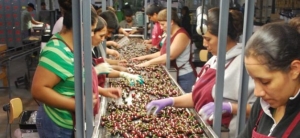A federal judge has decided a cherry sold as Glory is really Staccato under a different name.
The ruling marks a turning point in a long-running intellectual property dispute between the Canadian government and three Washington fruit businesses.
Both sides expect the legal battle to continue, however, to settle myriad accusations of business interference, false advertising and agreement breaches, not to mention pinning down monetary damages and what to do with existing trees.
A new court date has not been set.
U.S. District Court Judge Stanley Bastian of the Eastern District of Washington made the ruling in August after a findings-of-fact bench trial. Summerland Varieties Corp., which commercializes fruit varieties for the Canadian government, sent a news release about the decision in late October, attributing the delay to staff being too busy with harvest during August.
In 2020, the Canadian government sued two Washington fruit growers and a nursery for propagating and distributing budwood of one of its cherries as their own. Agriculture and Agri-Food Canada, roughly equivalent to the U.S. Department of Agriculture, alleged the cherry was Staccato, a late-maturing variety it had bred, patented and trademarked.
Those defendants are Van Well Nursery of Wenatchee and producers Monson Fruit and Gordon Goodwin. Van Well had a testing license to grow trial blocks of Staccato, but not to sell it.
The defendants countered their cherry was a new chance sport of a different variety, found in Goodwin’s orchard, that also matured late. Goodwin won his own patent for the cherry and worked with Van Well to distribute budwood. Van Well later sold trees by the thousands to Monson to produce and sell fruit at scale under the trade name Glory.
In April this year, Bastian began a bench trial only to determine if the two cherries are indeed the same. Numerous growers, horticulturists and geneticists testified about DNA samples, stem pull retention, crop timing and a host of other characteristics. Both sides said DNA tests back up their claims.
In August, Bastian sided with Canada, calling its DNA screens more accurate, complete and advanced. He decided the two cherries are identical, writing “‘Glory’ is Staccato” near the end of his 27-page opinion.
Summerland expressed vindication and gratification for the decision.
“This ruling should serve as a warning to those who improperly seek to free-ride on Agriculture and Agri-Food Canada’s tree fruit development program,” Sean Beirnes, Summerland general manager, said in a news release on Oct. 30.
Today, the only U.S. packer and marketer licensed to grow and sell Staccato cherries is Stemilt Growers of Wenatchee.
Earlier in the case, in 2022, the court invalidated Agri-Food’s patent because the agency had filed for it after the cherry had been sold commercially by another company for more than a year. However, Beirnes said that does not affect Agri-Food’s claims of false advertising, business interference and conversion — a legal term for taking something without permission and passing it off as your own.
“AAFC’s remaining claims stand on their own; they don’t rely on a patent,” Beirnes said.
The defendants also believe the judge’s ruling does not finalize the dispute for several reasons, Mark Walters, a Seattle-based attorney representing Monson Fruit, said in an email to Good Fruit Grower.
The cherries produced by the trees in question are sold as dark sweet cherries, leaving no chance of consumer confusion, Walters said. Also, the growers and Van Well maintained they either lawfully purchased their trees or produced them by propagating public-domain plant material.
The defendants also have countersued, alleging Agri-Food used fraud to obtain the now invalidated patent, Walters said.
“If the plaintiff wins this case by using state and federal trademark law to control the propagation of an unpatented variety, that will certainly set a new and potentially dangerous precedent, because it could lead to similar claims against other Canadian-developed and unpatented varieties that are widely grown in the U.S., including Sweetheart and Lapins,” Walters said.
—by Ross Courtney








Leave A Comment